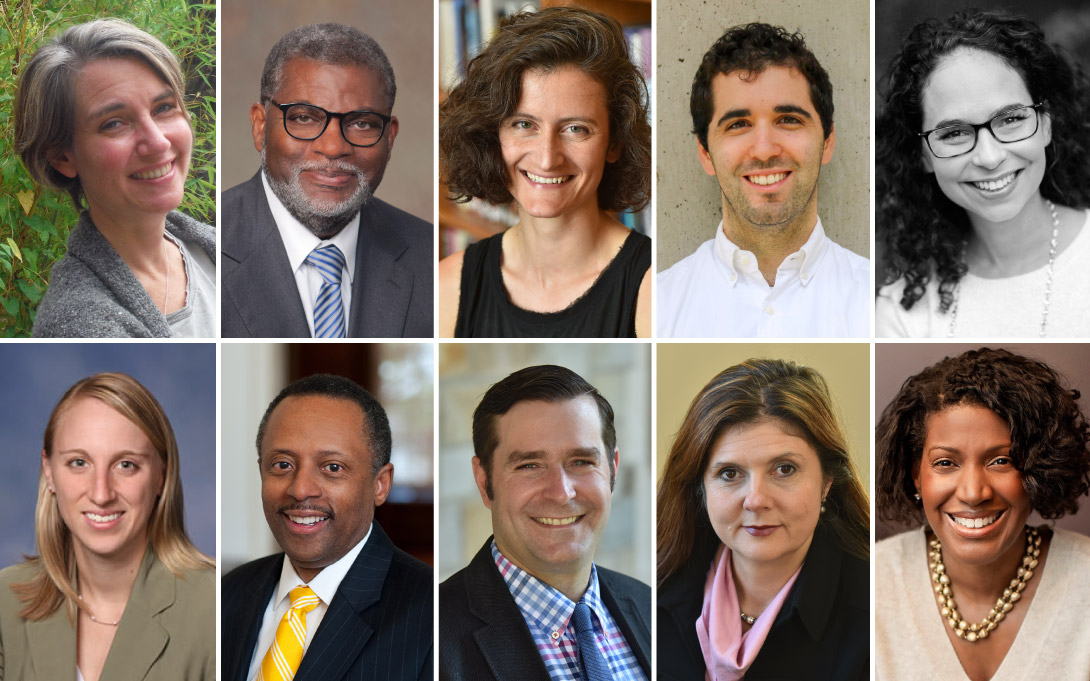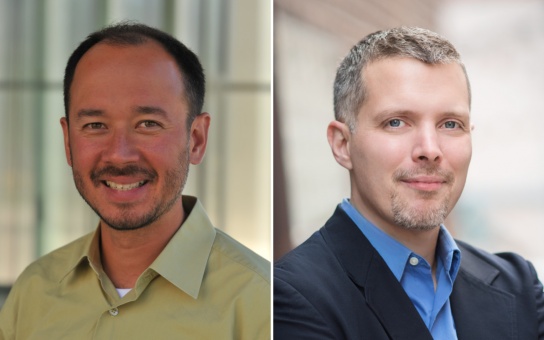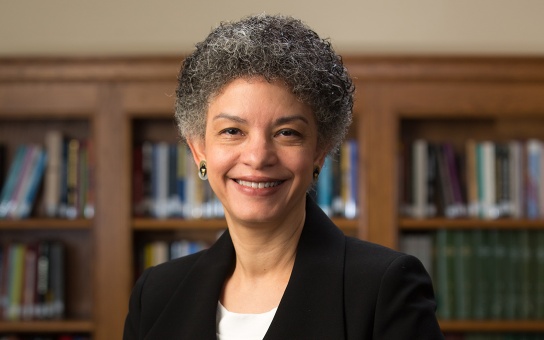
Arun Agrawal was selected as co-chair on the Intergovernmental Transformative Change Assessment, sponsored by the Intergovernmental Platform on Biodiversity and Ecosystem Services.
Javed Ali provided his expertise on national security to numerous media outlets, including ABC News and the Detroit Free Press, to analyze the Russian invasion of Ukraine. He also published an op-ed called “The Ghosts of Afghanistan Haunt Ukraine” in The Cipher Brief.
Robert Axelrod and coauthors published “Preventing extreme polarization of political attitudes” in the Proceedings of the National Academy of Sciences.
The Michigan Institute for Clinical & Health Research recognized John Ayanian with the Distinguished Clinical and Translational Research Mentor Award. Ayanian also delivered his U-M Distinguished University Professorship lecture called “The Quest for Health Equity.”
Postdoctoral fellow Joshua Basseches published “Climate policy conflict in the U.S. states: a critical review and way forward” in Climatic Change. He also accepted a tenure-track position as the Flowerree Assistant Professor of Public Policy and Environmental Studies at Tulane University.
Jenna Bednar published “Polarization, diversity, and democratic robustness” in the Proceedings of the National Academy of Sciences.
The Heinz Family Foundation awarded Bill-Bynum with a Heinz Award for combating the extent to which factors such as race, gender, birthplace, and wealth limit one’s ability to prosper.
Charlotte Cavaillé’s paper, “Elite Cues and Economic Policy Attitudes: The Mediating Role of Economic Hardship,” was co-authored by Anja Neundorf and published in Political Behavior.
Ben Green edited a special issue of the Journal of Social Computing, called “Technology Ethics in Action: Critical and Interdisciplinary Perspectives,” which featured his articles “The Contestation of Tech Ethics: A Sociotechnical Approach to Technology Ethics in Practice” and “Data Science as Political Action: Grounding Data Science in a Politics of Justice.”
Catherine Hausman and Sam Stolper published “Inequality, information failures, and air pollution” in the Journal of Environmental Economics and Management.
Morela Hernandez penned a column titled “The Problem With Certainty” in the MIT Sloan Management Review.
In partnership with the city of Flint, Tom Ivacko, Stephanie Leiser, and CLOSUP began a Mott Foundation supported project that will examine whether a new fiscal reporting mechanism can help create transparency in local fiscal reporting.
Brian Jacob and Christina Weiland were included in Education Week’s 2022 RHSU Edu-Scholar Public Influence Rankings, along with 200 other scholars. Christina Weiland partnered with MRDC to develop an early childhood research agenda for the Archdiocese of Boston.
David Johnson and coauthors published a working paper in the National Bureau of Economic Research titled “Household Spending Responses to the Economic Impact Payments of 2020: Evidence from the Consumer Expenditure Survey.”
Earl Lewis delivered a U-M Distinguished University Professorship lecture titled, “How Questions of Power, Race and Identity Shaped a Career.”
Following the Russian invasion of Ukraine, Melvyn Levitsky became an essential source for media outlets seeking to explain the situation. He was featured in numerous articles, podcasts, and videos, calling on his diplomatic experience with the Soviet Union.
Ann Chih Lin was named the director of the University of Michigan Lieberthal-Rogel Center for Chinese Studies (see story, p. 12.)
Brian McCall edited the first edition of The Routledge Handbook of the Economics of Education, and wrote a chapter for the book titled, “College persistence and bachelor’s degree completion.”
The National Academies of Sciences, Engineering, and Medicine selected Shobita Parthasarathy to serve on a committee that will help guide federal judges on questions of science, technology, and medicine in litigation. Parthasarathy also published an article “Innovation as a Force for Equity” in Issues in Science and Technology.
Natasha Pilkauskas published two Poverty Solutions research briefs, “Receipt and usage of the Child Tax Credit payments among low-income families” with Patrick Cooney and “Families with low incomes and the Child Tax Credit: Who is still missing out?” with Katherine Michelmore. She also received a grant from U-M’s CHEAR Center for research on the Child Tax Credit.
Barry Rabe spoke at a symposium of the International Association for Energy Economics at the annual meeting of the Allied Social Sciences Association; his talk was titled, “Decarbonizing the Global Economy: Balancing Economic Efficiency and Political Feasibility.” He also published an article in the Milken Institute Review, “When U.S. Climate Policy Works: Lessons from Regulating Short-Lived Emissions.”
Kaitlin Raimi published an article called “How to encourage pro-environmental behaviors without crowding out public support for climate policies” in Behavioral Science & Policy.
Luke Shaefer partnered with the city of Detroit to encourage Detroiters to file their taxes and claim their refunds. He also published “Material Hardship and Well-Being of U.S. Households at the End of 2021” with Patrick Cooney and Samiul Jubaed.
Charles Shipan’s book Why Bad Policies Spread (And Good Ones Don’t) was published by Cambridge University Press. Shipan also coauthored a Monkey Cage analysis in The Washington Post called “The Supreme Court’s decision about the vaccine mandate could eventually undo almost every major federal law.”
Kevin Stange and coauthors published a working paper in the National Bureau of Economic Research, “College Majors and Skills: Evidence from the Universe of Online Job Ads.”
Betsey Stevenson was named to the National Academy of Social Insurance. Stevenson also appeared before the U.S. House Select Subcommittee on the Coronavirus Crisis, in a hearing about COVID-19’s impact on the child care sectors and American families.
Celeste Watkins-Hayes was named an inaugural Research & Community Impact Fellow by the U-M Provost’s Anti-Racism Collaborative and was elected as a member to the Sociological Research Association. She also joined the Russell Sage Foundation Journal of the Social Sciences editorial board. In addition, Watkins-Hayes spoke at the City Club of Cleveland’s World AIDS Day Event.
Congratulations

U-M top honors for Yang and Shaefer
The Rackham Graduate School awarded Dean Yang with the Distinguished Graduate Mentor Award for his creation of a rigorous and supportive environment for student scholarship and research and enriching students’ long-term professional development through mentorship and research opportunities. Luke Shaefer received a U-M Presidential Award for Public Engagement for his advocacy for the expanded Child Tax Credit and his dedication to leveraging research to help communities and advance social policy.

Collins to lead Boston Fed
Former Ford School Dean Susan M. Collins, who has served as the U-M provost since January 2020, is leaving the University to become president and CEO of the Federal Reserve Bank of Boston.
“It is an honor and an inspiration to serve as the Boston Fed’s next president,” Collins said. “Throughout my career, I have been driven by a commitment to leveraging research, education and public service to improve lives.”
More in State & Hill
Below, find the full, formatted spring 2022 edition of State & Hill. Click here to return to the Spring 2022 S&H homepage.
